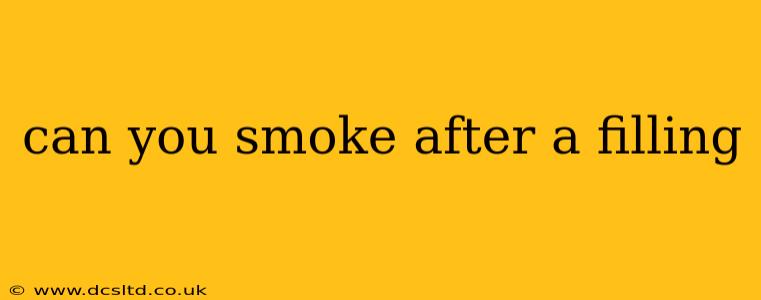Can You Smoke After a Filling? The Risks and Recovery
Getting a dental filling is a common procedure, but the recovery process is crucial for ensuring the filling's longevity and your overall oral health. Many patients wonder about the impact of smoking on this recovery, and the short answer is: no, you should absolutely avoid smoking after getting a filling. Smoking significantly hinders the healing process and increases the risk of complications.
This article will delve into the reasons why smoking after a filling is detrimental, exploring the potential negative consequences and offering advice for smokers seeking dental care. We will also address some frequently asked questions surrounding this topic.
Why Should You Avoid Smoking After a Filling?
The immediate aftermath of a filling involves the gradual hardening of the filling material and the healing of the tooth's underlying tissues. Smoking introduces several factors that can disrupt this process:
-
Impaired Healing: Nicotine constricts blood vessels, reducing blood flow to the affected area. This diminished blood flow limits the delivery of essential nutrients and oxygen needed for optimal healing and can prolong recovery time. The slower healing also increases the risk of infection.
-
Increased Infection Risk: Smoking weakens the immune system, making you more susceptible to infections. The mouth is a breeding ground for bacteria, and a compromised immune system increases the likelihood of an infection developing at the filling site. This can lead to complications requiring further treatment.
-
Loose Filling: The suction created by smoking can dislodge a newly placed filling, especially in the initial days of healing. This can require a costly and time-consuming return visit to the dentist for repair.
-
Delayed Bonding: Many fillings rely on bonding agents to adhere properly to the tooth structure. Smoking interferes with this bonding process, potentially compromising the filling's longevity and increasing the risk of it falling out prematurely.
-
Dry Socket: While less directly related to the filling itself, smoking significantly increases the risk of dry socket after tooth extraction, a procedure often associated with fillings (e.g., before a large filling). A dry socket is an extremely painful complication that can delay healing considerably.
What Happens if I Smoke After a Filling?
The consequences of smoking after a filling can range from minor inconveniences to serious complications. You might experience:
-
Prolonged discomfort or pain: Healing will take longer, and you might experience persistent sensitivity to temperature or pressure.
-
Failure of the filling: The filling might become loose or fall out altogether, requiring a replacement.
-
Infection: An infection around the filling site could develop, leading to swelling, pain, and potential abscess formation. This may necessitate antibiotic treatment or more extensive procedures.
-
Dry Socket (if extraction was involved): Intense pain and delayed healing are common, possibly requiring surgical intervention.
How Long Should I Wait to Smoke After a Filling?
Ideally, you should avoid smoking entirely for at least 24-48 hours after getting a filling to allow for proper initial bonding and healing. The longer you abstain from smoking, the better the chances of a successful outcome. Quitting smoking altogether is the best course of action for long-term oral and overall health.
Can I Smoke a Vape After a Filling?
Vaping, while often presented as a healthier alternative, still carries risks after a dental filling. The heated vapor can irritate the sensitive area, potentially delaying healing and increasing the risk of infection. It's best to avoid vaping as well, at least for the initial 24-48 hours.
How Can I Quit Smoking to Protect My Dental Health?
Quitting smoking is one of the best things you can do for your overall health and dental hygiene. It improves healing, reduces infection risk, and contributes to long-term oral health. Your dentist can provide resources and support to help you quit. There are numerous cessation programs and medications available to aid in the process.
In conclusion, avoiding smoking after a dental filling is paramount for successful healing and the longevity of your restoration. The risks associated with smoking significantly outweigh any perceived benefits. If you're a smoker, consult your dentist about strategies for quitting to improve your oral and overall health.
